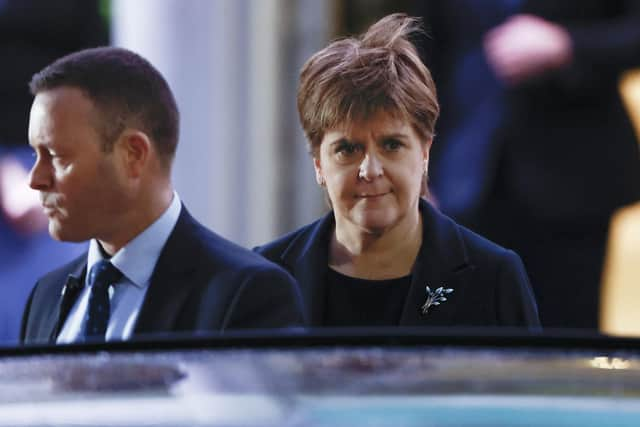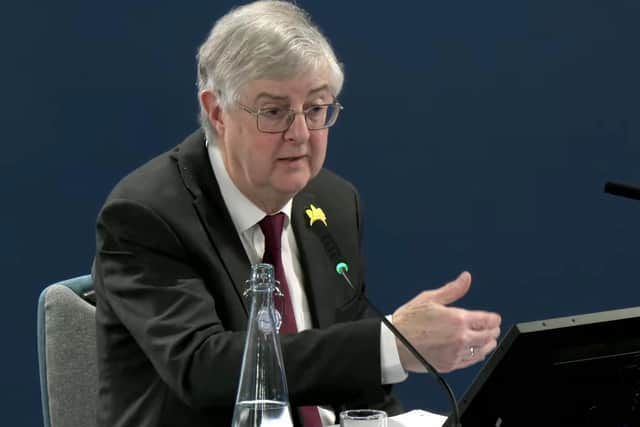UK politicians 'afraid' of Nicola Sturgeon, UK Covid inquiry told
UK politicians were "afraid of Nicola Sturgeon" during the pandemic, the First Minister of Wales has said.
Addressing the UK Covid-19 Inquiry in Cardiff, Mark Drakeford said: "I have the highest regard for the First Minister of Scotland and First Minister and Deputy First Minister in Northern Ireland, they were never anything but collegiate people, they took phone calls, they were involved in discussions.
Advertisement
Hide AdAdvertisement
Hide Ad"The UK Government was always anxious about their interactions with the FM of Scotland because she had a different underlying ambition for the future of Scotland and that coloured their attitude towards her.


"She's also a formidable politician.
"Many UK ministers were afraid of her and would not like to be involved in a confrontational dialogue with her."
He added that this was not true of the Prime Minister, but Boris Johnson did not want to give the impression that he was "on par" with first ministers of other nations.
Responding to the comments, a senior SNP source said: “People often fear the unfamiliar – it’s understandable that Nicola’s competence, compassion and integrity unsettled some of the Westminster Government.”


Giving evidence at the inquiry when it held hearings in Edinburgh in January, Ms Sturgeon denied making pandemic decisions for political reasons, adding she had not “thought less” about politics and Scottish independence in her life than she did during the Covid crisis.
She repeatedly fought back tears during her evidence session, and said: “People will make their own judgments about me, about my government, about my decisions, but for as long as I live, I will carry the impact of these decisions, I will carry regret at the decisions and judgments I got wrong, but I will always know in my heart, and in my soul, that my instincts and my motivation was nothing other than trying to do the best in the face of this pandemic.”
She faced criticism after confirming to the inquiry she had deleted her pandemic-era WhatsApp messages, though she stressed this was in line with official advice, and she said all “salient” points were placed on the corporate record.
The inquiry also heard in January that Ms Sturgeon branded Mr Johnson a “f****** clown” in a series of messages during what she said was his “f****** excruciating” announcement of a second national lockdown for England.
Advertisement
Hide AdAdvertisement
Hide AdShe made the comments in a series of messages with her then chief of staff.
Mr Drakeford also told the inquiry that he used WhatsApp on 11 occasions during the pandemic.
"I've had the record checked,” he said. “There are 11 occasions. One of those, I say 'thanks'. That's one of them.
"In another one, I complain I can't hear the sound of the Senedd when I'm meant to be answering questions. It's certainly true, I did use, but I'm a very, very infrequent user of WhatsApp.
"I'm a much more frequent user of text messages."
The hearing was told that a number of Welsh Government policies cover the use of informal communication, with WhatsApp prohibited for discussions of government business.
Mr Drakeford replied: "I do accept that. It's the policy that's wrong, not the practice."
Earlier, the Welsh First Minister said he "absolutely regrets everything that led to loss of life" during the pandemic.
He made the comment when giving evidence to the during questioning over the Welsh Government's policies concerning care homes.
Advertisement
Hide AdAdvertisement
Hide AdHe was questioned whether the risk of spreading Covid-19 from hospitals to care homes, containing some of the most vulnerable people, was properly managed by the Welsh Government in the early part of the pandemic.
Mr Drakeford said that discharging vulnerable patients from hospital was considered "the safest thing that we could do" at the time, and referenced evidence by England's chief medical officer Sir Chris Whitty on the issue.
He told the inquiry: "He makes the point that the risks to very vulnerable people staying in hospital when they are medically fit to be discharged, at a point when hospitals are about to become the epicentre of the most dangerous place you could be, then that was not a course of action that had merit.
"You are discharging people back to their homes, some people live in care homes but it is their home and they are fit to be discharged there, and there are protections that can be put in place to try to manage the impact of the disease when they get there.
"That was the line of reasoning that we were following at the time, that the safest thing that we could do was to remove people who didn't need to be in hospital out of hospital given the impact that the disease was about to have on those hospital services.
"And that when people went home, there were precautions that could be taken to try to manage the risks that they would face there."
The inquiry heard that on April 29 2020, the Welsh Government policy changed so that all patients should be tested for Covid-19 before being discharged from hospital to care homes.
Mr Drakeford said if that decision had been taken earlier, it would have meant tests were not available for other purposes.
Advertisement
Hide AdAdvertisement
Hide Ad"There weren't enough tests to do all that we would have liked with them," Mr Drakeford said.
The hearing was told the UK Government announced mass testing of asymptomatic residents and staff across care homes in England on April 28.
Two days later, a group of MPs wrote to Mr Drakeford to express concern that he had not done so.
When asked about his response to that letter, Mr Drakeford said: "I think this is terribly difficult territory because I know just how powerfully people feel about what happened in care homes here in Wales.
"I absolutely regret everything that led to loss of life. My own mother lived in a care home in Wales throughout this pandemic.
"These are matters that in a Welsh context, the decision-makers are not immune from the decision that we take."
Mr Drakeford acknowledged that there were instances of Covid-19 being "seeded" into care homes by people being discharged from hospital.
However, he said the primary reason for the virus entering care homes was through people going into them to care for those living there.
Advertisement
Hide AdAdvertisement
Hide AdHe added: "As coronavirus rises in the community, the risk that it will be carried into care homes in that way increases and I know for a lot of people that's an uncomfortable conclusion but I think it is where the evidence that I have seen takes us."
Referencing the letter, Mr Drakeford said he had to "rely upon the orderly decision making process" that Welsh Government had rather than being "buffeted" by letters.
The inquiry continues.